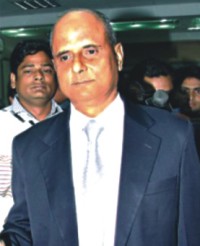Musings
Heroes in Our Times
Syed Badrul Ahsan
 |
Sardar Fazlul Karim, Photo: courtesy |
The good men and women, the heroes I have tried to emulate all these years, are a dwindling band nowadays. But, again, in an era of all-consuming mediocrity you do not go looking for heroes, of the kind you have come across since your happy childhood days. Even so, these days, there are individuals who convince me that ideals are yet a foundation we live by, that darkness does not have to be a permanent fixture of experience. Sardar Fazlul Karim has just had the good fortune of observing the eighty-sixth anniversary of his birth. His has been a life of not merely a ceaseless struggle in defence of those less fortunate than we but also has been a powerful lesson for all of us in the sanctity of values. He was and remains a heroic figure for me. In this age of crass commercialism, not many are there who, like, Karim, can traipse down the university area with a cotton bag slung over his shoulder, a ready, humble smile playing all across his face. Inner brilliance sparkles in his eyes.
Men like Sardar Fazlul Karim have always been great teachers. You think here of Serajul Islam Choudhury, the academic-cum-public intellectual who has consistently drilled the lesson in you that knowledge is that pillar which accords meaning to your life. Choudhury ought to have been vice chancellor; governments in Bangladesh would have enriched their intellect and strengthened their foundations through seeking his opinions on the issues that assail us as a society. And yet we note that the loss has never been Choudhury's. It has been that of those who have always laid great store by raw power. You spend an hour or even less with Choudhury, wondering all the while how such cerebral profundity can emanate from so simple a presence. It is the power of the mind that Choudhury passes on to you. The power of politicians, power that comes with hauteur, then sinks to nothingness.
 |
Hasan Mashhud Chowdhury, Photo: courtesy |
Among my heroes is Amartya Sen. As in Karim and Choudhury, humility is the engine that has purposefully powered his intellect. All great men and women are humble; all pretentious ones are humbugs driven by a consuming passion for self-promotion. In Sen, you spot that urbanity which is a defining characteristic of men striving to be modern. A profound scholar inhabits the being in Amartya Sen, in whom clarity of views and perspicacity of understanding are factors that work as educative tools for the plebeians in us. Sen is an atheist, but is not willing to talk about it. You are amazed, indeed impressed by his sure sense of who he is. You get the feeling that he is one riveting personality you would like to emulate as you move along.
My heroes have predominantly been people whose experiences have been shaped largely by their links to life as it is lived around them and by the books they have read along the way. Buddhadeb Bhattacharya may be in political trouble today in West Bengal, but that does not obscure the truth that his has been leadership based on a charming combination of socialistic awareness and intellectual social comprehension. He might lose the election; or he might just scrape back to office. That matters not much, for Bhattacharya will always be the unassuming intellectual whose wide reading has given his stewardship of his party and of his state a meaning which run-of-the-mill politicians can only dream of coming by.
 |
Buddhadeb Bhattacharya |
In Hasan Mashhud Chowdhury, the retired general who once ran the Anti-Corruption Commission in this country, there is a modern man not afraid to say no to the arrogance of power. This nation ought to have treated him better. This government, when it came into office, should have appreciated the measure of the man, should have made sure that he stayed on. Chowdhury's crusade against corruption gave us hope and instilled in us the belief that it is possible for a state to understand the difference between black and white, that having understood that principle it can and will identify with the white. Chowdhury was a thinker's soldier because he was and is a thinking man. He reads; he finds time for music and he cares about the country. And those are qualities which define heroism.
In a world where many of us are afraid to confront power, to remind it of its fleeting and often dangerous nature, Arundhati Roy informs you that writing on public issues is not enough. Writing must come with an adoption of a position, with nary a thought to the repercussions that might follow. Roy has challenged corruption in India; she has come down hard on the United States over its policies across the globe. And she has done that regardless of the reactions of the powers that be. Her sense of what is right has enabled her to do what people of conviction and courage always do: they give short shrift to the poverty sprouting in small minds.
These are my heroes. They respect power without genuflecting before it. They do not flatter; they are not sycophantic and in their smiles you will not spot anything of the ingratiating. They are all powerhouses. They are power.
|
Copyright
(R) thedailystar.net 2011 |
